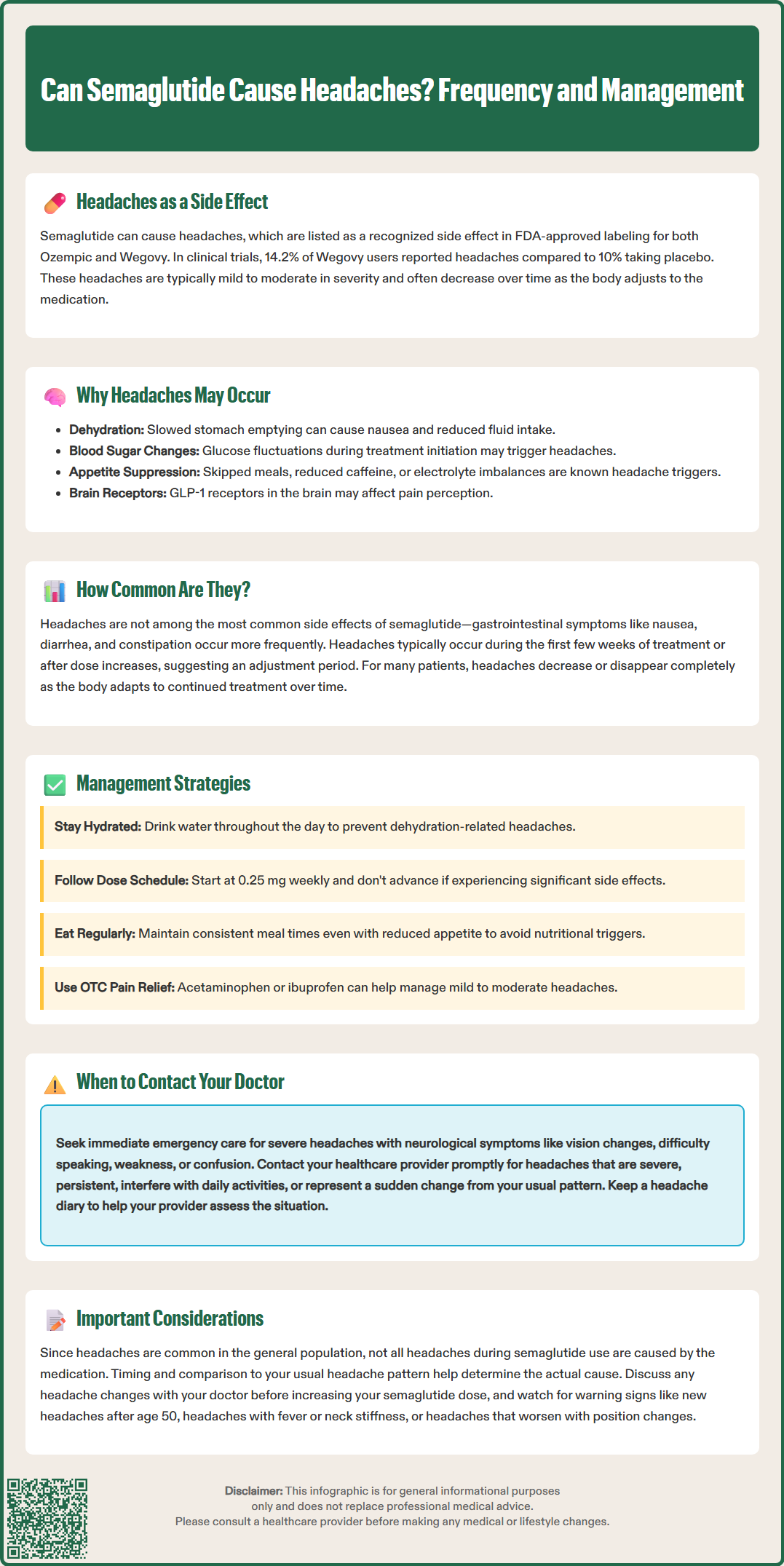LOSE WEIGHT WITH MEDICAL SUPPORT — BUILT FOR MEN
- Your personalised programme is built around medical care, not willpower.
- No generic diets. No guesswork.
- Just science-backed results and expert support.
Find out if you’re eligible

Semaglutide, marketed as Ozempic for type 2 diabetes and Wegovy for weight management, can cause headaches as a recognized side effect. This glucagon-like peptide-1 (GLP-1) receptor agonist works by enhancing insulin secretion, suppressing appetite, and slowing gastric emptying. While effective for glycemic control and weight reduction, these physiological changes may trigger headaches in some patients. Clinical trials show headaches occur in approximately 14% of patients taking Wegovy compared to 10% receiving placebo. Understanding the relationship between semaglutide and headaches helps patients and clinicians manage this side effect effectively while maintaining treatment benefits.
Quick Answer: Semaglutide can cause headaches as a recognized adverse reaction, occurring in approximately 14% of patients taking Wegovy compared to 10% receiving placebo.
Yes, semaglutide can cause headaches as a recognized side effect. According to FDA-approved labeling, headache is listed among the adverse reactions for both Ozempic (semaglutide for type 2 diabetes) and Wegovy (semaglutide for weight management). Specifically, headache is included among common adverse reactions (occurring in ≥5% of patients) for Wegovy, while for Ozempic it is reported but not among the most frequently occurring side effects.
Semaglutide is a glucagon-like peptide-1 (GLP-1) receptor agonist that works by mimicking the action of the naturally occurring hormone GLP-1. It enhances insulin secretion in a glucose-dependent manner, suppresses glucagon release, slows gastric emptying, and reduces appetite through central nervous system pathways. While effective for glycemic control and weight reduction, these physiological changes can produce various side effects, including headaches in some patients.
Clinical trial data suggests headaches may occur somewhat more frequently with semaglutide than with placebo, though the difference varies across studies. Headaches associated with semaglutide are typically mild to moderate in severity and often diminish as the body adjusts to the medication. Understanding this potential side effect helps patients and clinicians make informed decisions about treatment.
It is important to distinguish between headaches that may be related to the medication and those that could result from secondary factors such as dehydration, changes in eating patterns, or blood glucose fluctuations—all of which can occur when starting semaglutide therapy.

The mechanisms underlying semaglutide-related headaches are not fully understood, but several physiological factors may contribute to their occurrence. As a GLP-1 receptor agonist, semaglutide acts on receptors distributed throughout the body, including the central nervous system, gastrointestinal tract, and cardiovascular system.
One proposed mechanism involves the medication's effect on gastric emptying. Semaglutide significantly slows the rate at which food leaves the stomach, which can lead to nausea and altered fluid balance. Dehydration resulting from reduced fluid intake (due to decreased appetite) or from gastrointestinal side effects such as nausea, vomiting, or diarrhea may precipitate headaches. Additionally, changes in blood glucose levels can occur during treatment initiation, and glucose fluctuations are known headache triggers for some individuals.
Central nervous system effects may also play a role. GLP-1 receptors are present in brain regions involved in appetite regulation, reward pathways, and potentially pain modulation. The medication's action on these receptors could theoretically influence headache susceptibility, though this remains an area requiring further research.
Changes in dietary patterns associated with semaglutide use represent another potential contributing factor. Patients often experience significant appetite suppression and may inadvertently reduce their caloric intake substantially or skip meals. This can lead to caffeine withdrawal (if coffee or tea consumption decreases), missed meals, or electrolyte imbalances—all recognized headache precipitants.
It's worth noting that hypoglycemia, which can manifest as headache, is uncommon with semaglutide monotherapy due to its glucose-dependent mechanism of action. However, the risk increases when semaglutide is used in combination with insulin or sulfonylureas.
Clinical trial data provides insight into the frequency of headaches among semaglutide users. According to the FDA Prescribing Information for Wegovy (semaglutide 2.4 mg for weight management), headache was reported in 14.2% of patients receiving the medication compared to 10.0% in the placebo group in the STEP 1 trial.
For Ozempic (semaglutide for type 2 diabetes), headache incidence varies across the SUSTAIN clinical trials. While headache is reported as an adverse reaction, it is not listed among the most common adverse events in the FDA Prescribing Information for Ozempic. In some SUSTAIN trials, headache rates were similar between semaglutide and placebo groups.
These figures indicate that while headaches may occur with semaglutide, the absolute increase in risk compared to placebo is relatively modest. The incidence may vary based on the specific indication and dosage. However, headaches are generally not among the most common adverse effects of semaglutide—gastrointestinal symptoms such as nausea, diarrhea, and constipation occur more frequently.
The timing of headache onset varies among patients. Some individuals experience headaches during the initial weeks of treatment or following dose escalation, suggesting an adaptation period. For many patients, headaches diminish or resolve completely as treatment continues and the body adjusts to the medication.
It is worth noting that headache prevalence in the general population is substantial, with tension-type headaches and migraines affecting millions of Americans. Therefore, not all headaches occurring during semaglutide therapy are necessarily caused by the medication. Careful assessment of headache characteristics, timing relative to medication initiation or dose changes, and comparison to the patient's baseline headache pattern helps determine causality.
Several strategies can help minimize or manage headaches associated with semaglutide therapy. First and foremost, maintaining adequate hydration is essential. Patients should be counseled to drink sufficient water throughout the day, particularly if experiencing gastrointestinal side effects. Hydration needs should be individualized based on body size, activity level, climate, and medical conditions—patients with heart failure or kidney disease should follow their healthcare provider's specific fluid intake recommendations.
Gradual dose titration, as recommended in the prescribing information, helps reduce the likelihood and severity of side effects including headaches. For Ozempic, this typically involves starting at 0.25 mg weekly for four weeks, then increasing to 0.5 mg weekly. For Wegovy, the recommended schedule starts at 0.25 mg weekly, with monthly increases (0.5 mg, 1.0 mg, 1.7 mg) until reaching the 2.4 mg maintenance dose. Patients should not advance to higher doses if they are experiencing significant side effects at their current dose level.
Maintaining consistent eating patterns despite reduced appetite can prevent headaches related to missed meals or nutritional deficiencies. Patients should aim for regular, balanced meals even if portions are smaller. Monitoring blood glucose levels is particularly important for patients with diabetes, especially those taking insulin or sulfonylureas in addition to semaglutide, as these combinations increase hypoglycemia risk.
Over-the-counter analgesics such as acetaminophen (up to 3,000 mg daily for adults without liver disease) or ibuprofen (with appropriate cautions regarding gastrointestinal, cardiovascular, and kidney risks) can provide symptomatic relief for mild to moderate headaches. Patients should follow package directions and consult their healthcare provider before regular use of any pain medication.
For patients with pre-existing migraine disorders, continuing their established preventive or abortive migraine therapies is generally appropriate. While there are no known direct pharmacokinetic interactions between semaglutide and common migraine medications, semaglutide's effect on gastric emptying may delay the absorption and onset of oral medications, including pain relievers and triptans. Non-oral formulations may be preferable for some patients, particularly if nausea is present.
While mild headaches are a recognized side effect of semaglutide, certain headache characteristics warrant prompt medical evaluation. Patients should contact their healthcare provider if headaches are severe, persistent, or significantly interfere with daily activities. A sudden, severe headache that differs markedly from previous headache patterns—sometimes described as "the worst headache of my life"—requires immediate medical attention as it may indicate a serious condition unrelated to semaglutide.
Headaches accompanied by neurological symptoms such as vision changes, difficulty speaking, weakness, numbness, confusion, or loss of consciousness constitute medical emergencies requiring immediate evaluation, typically in an emergency department. These symptoms could indicate stroke, severe hypertension, or other serious conditions that require urgent assessment and treatment.
Other concerning features that warrant prompt medical attention include: new headache onset after age 50, headache during pregnancy or postpartum period, headache with fever or neck stiffness, headache following head trauma, headache in immunocompromised patients, and headache that worsens with position changes or Valsalva maneuver (coughing, straining).
Patients should also seek medical advice if headaches are associated with persistent vomiting, as this combination can lead to dehydration and electrolyte disturbances. Similarly, headaches occurring with signs of hypoglycemia (shakiness, sweating, rapid heartbeat, confusion) require prompt attention, particularly in patients taking insulin or sulfonylureas in addition to semaglutide, as dose adjustments of these medications may be necessary.
If headaches develop or worsen after a dose increase, patients should discuss this with their provider before the next scheduled dose escalation. In some cases, maintaining the current dose for a longer period or implementing a more gradual titration schedule may be appropriate.
Documenting headache frequency, severity, timing, associated symptoms, and any identified triggers helps healthcare providers assess the situation accurately and develop an appropriate management plan. Patients should not discontinue semaglutide without medical guidance unless advised to stop for an urgent safety concern (such as suspected pancreatitis or hypersensitivity reaction).
Clinical trials show headaches occur in approximately 14% of patients taking Wegovy (semaglutide 2.4 mg) compared to 10% in the placebo group. For Ozempic, headache rates are similar between semaglutide and placebo groups in most trials.
Yes, headaches associated with semaglutide are typically mild to moderate and often diminish or resolve completely as the body adjusts to the medication. Many patients experience improvement after the initial weeks of treatment or following dose escalation.
Maintain adequate hydration, follow the gradual dose titration schedule, eat regular balanced meals despite reduced appetite, and monitor blood glucose levels if you have diabetes. Over-the-counter analgesics like acetaminophen or ibuprofen can provide relief for mild to moderate headaches.
All medical content on this blog is created using reputable, evidence-based sources and is regularly reviewed for accuracy and relevance. While we strive to keep our content current with the latest research and clinical guidelines, it is intended for general informational purposes only.
This content is not a substitute for professional medical advice, diagnosis, or treatment. Always consult a licensed healthcare provider with any medical questions or concerns. Use of this information is at your own risk, and we are not liable for any outcomes resulting from its use.